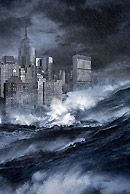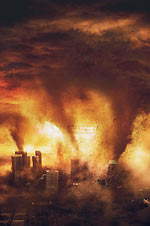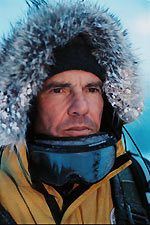 |
THE DAY AFTER TOMORROWFilm review by Lee Medcalf Director: Roland EmmerichStarring: Dennis Quaid, Jake Gyllenhaal, Emmy Rossum, Ian Holm
Aliens? Pah! Giant radioactive mutant lizards? Double pah! As a race we have defeated them all, but if there's one thing you can't escape, it's the world around you. This is where ID4 and Godzilla director Roland Emmerich is coming from with this movie. Global warming is a serious issue, but Hollywood knows that unless it's done in disaster movie style, the film is going to go nowhere. So, who better than Emmerich to helm such a project? A man who has been known simply for being good at "Blowin' shit up!" The story revolves around Dennis Quaid's climatologist, Jack Hall. Hall, in typical disaster movie style, is the only guy who really know what is about to happen. He and his small team try to convince the planet that we're in for some serious biblical-style bad weather. When Hall's son, Sam, (played by Donnie Darko's Jake Gyllenhaal), is trapped in New York by one of the many global events taking place, Hall decides to go to rescue him! And that is about it for the story, because from that point on all the old disaster movie clichés are wheeled out. Characters are introduced simply to be placed in peril for a few minutes, or to require one of the main characters to have to risk life and limb to save them. The movie's pacing is well handled, as Emmerich and writer Jeffrey Nachmanoff ramp up the global events from the small stuff, such as snow in India, to the barnstorming effects shots seen in all the trailers: the New York tidal wave, and the super tornados in L.A. Once the money shots are out the way, Emmerich is unable to keep up the pace, or retain the viewer's interest, almost as if he has nothing more to say or show once the effects are done and dusted. Sadly, this occurs about forty-five minutes into the film. The movie then settles into a staple 70's disaster movie format, with odd characters holding on and doing everything they can to stay alive in the face of adversity, or waiting to be rescued.
Beyond the love of a good disaster effect Emmerich cannot help return to the overtly jingoistic moments that made Independence Day so cringe-worthy: the stars and stripes are waved proudly around while the world freezes to death and, as with Independence Day, some of the speeches will clearly elicit groans and unintentional giggles along the way. Emmerich also takes his sledgehammer politics to the main concern of the film which is, of course, Global Warming. Here, Emmerich's stance on the subject is conveyed bluntly and with a heavy hand, even down to a homeless man wandering New York streets exclaiming how all the cars in the traffic jam are just making things worse.... The Day After Tomorrow is watchable in a corny, lazy, Sunday afternoon kind of way. Emmerich, even without his normal partner-in-crime Dean Devlin, has, as usual, managed to put all the good shots into the trailer, and, once again, promises much but delivers little. If you want my advice, watch the trailer and make up your own story. Rating 2 out of 5 |

 Like the proverbial tidal wave, the Summer
blockbuster season finally strikes us. From here on in we know we're in
for a drought of intelligence, a flood of special effects and a hurricane
of high-concept as the summer sun warms us up. These stretched metaphors
lead us nicely to the latest example of the genre, The Day After
Tomorrow.
Like the proverbial tidal wave, the Summer
blockbuster season finally strikes us. From here on in we know we're in
for a drought of intelligence, a flood of special effects and a hurricane
of high-concept as the summer sun warms us up. These stretched metaphors
lead us nicely to the latest example of the genre, The Day After
Tomorrow. Quaid and Gyllenhaal acquit themselves well in the
face of naff, quickly-discarded subplots, and an almost pornographic lust
for big buck effects moments. Both actors, along with Ian Holm's
scientist, give the film far more gravitas than it deserves. As for the
rest of the actors, none really stand out. They're nothing more than
walking moments of exposition or peril. They might as well simply have the
words DEAD MEAT emblazoned upon their foreheads.
Quaid and Gyllenhaal acquit themselves well in the
face of naff, quickly-discarded subplots, and an almost pornographic lust
for big buck effects moments. Both actors, along with Ian Holm's
scientist, give the film far more gravitas than it deserves. As for the
rest of the actors, none really stand out. They're nothing more than
walking moments of exposition or peril. They might as well simply have the
words DEAD MEAT emblazoned upon their foreheads.